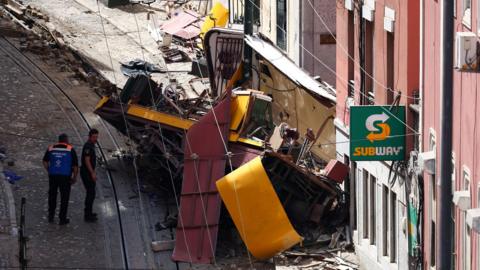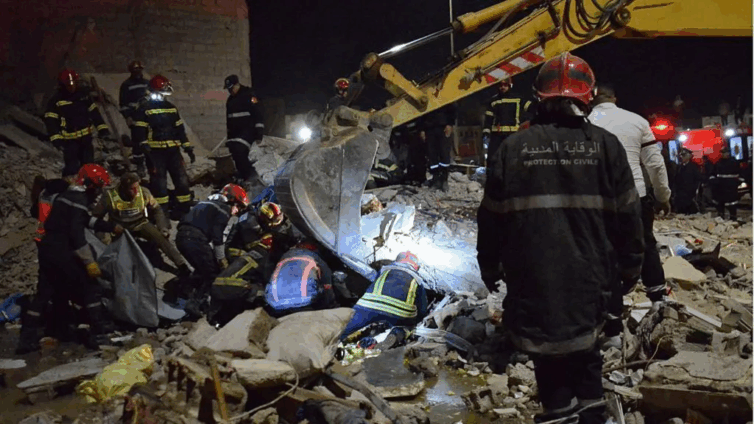Lisbon in Mourning as Glória Funicular Crash Claims 16 Lives, Injures 23

Portugal is in mourning following a devastating incident on Wednesday evening when Lisbon's renowned Glória funicular cable railway derailed, crashing into a building. The tragedy resulted in the deaths of 16 individuals and left 23 others injured, some critically. Portuguese Prime MinisterLuís Montenegroconfirmed the revised death toll on Thursday, noting that emergency services had initially reported 17 fatalities. Among the deceased were seven men and eight women, as stated by Margarida Castro Martins, head of Lisbon's Civil Protection Agency.
The victims represented a diverse group of nationalities, highlighting the funicular's popularity among both residents and tourists. Five of those killed were Portuguese, while the international toll included three Britons, two South Koreans, two Canadians, an American, a Ukrainian, a Swiss, and a French national. Police have not yet released all identities, but several victims have been named. André Jorge Gonçalves Marques, the funicular's brake guard, was identified among the dead by the Portuguese transport union Sitra and his employer Carris, who described him as a "dedicated, kind and happy professional."

Photo Credit: BBC News
Pedro Manuel Alves Trindade, a former volleyball referee and leader of theLisbon Volleyball Association, was also confirmed as a victim by the Portuguese Volleyball Federation. Additionally, four employees of the Santa Casa da Misericórdia organisation died in the crash, including lawyer Alda Matias.
Eyewitnesses recounted the terrifying moments of the crash, which occurred just after 18:00 local time. Helen Chow, at the base of the hill, described hearing a sound "like a bomb" followed by "complete scary silence" and "pitch black smoke." Rasha Abdo, travelling in the lower carriage, stated there were "no brakes in our cable car, it was going down fast, with acceleration, like there was no control." She recalled the carriage coming to a "very hard" hit, causing people to crash into each other.
Abel Esteves, another passenger in the lower carriage, feared for his life, shouting to his wife, "we are all going to die here," as he saw the upper carriage descending rapidly. People were seen running to help, with some jumping from the lower tram's windows, while others, like tour guide Marianna Figueiredo, rushed to the scene to assist, only to be met by a devastating silence and then the sight of dead bodies as the wreckage was cleared.

Photo Credit: Al Jazeera
The Glória funicular, a 140-year-old railway system, operates with two carriages attached to a cable, allowing one to ascend as the other descends. Witnesses indicated that the lower carriage made a hard stop, while the upper carriage careened around a bend at full speed, crashing into a building. Eric Packer, a tourist who had just decided to walk instead of taking the funicular, heard a loud crash "like a rock falling" shortly after 18:00 and returned to witness the "magnitude of what had taken place."
In the aftermath, Portugal declared a national day of mourning. The capital's public transport operator, Carris, which runs the funicular, stated that an independent investigation has been launched and all funiculars in Lisbon would be inspected. Carris maintained that all maintenance protocols had been rigorously followed, with the last general maintenance carried out in 2022. The Glória funicular, opened in 1885 and electrified decades later, is not only a popular tourist attraction but also a vital means for Lisbon residents to navigate the city's steep, cobbled streets. The incident has left the city in shock and raised questions about the safety of its historic transport systems.
Recommended Articles
Ronaldo's World Cup Dream: Star Cleared for 2026 Openers!

Cristiano Ronaldo has been cleared by FIFA to play in Portugal’s 2026 World Cup openers after two matches of his three-g...
Russian Military Atrocities Exposed: Defecting Troops Face Sledgehammer Executions and Horrific Torture

Russian soldiers are facing brutal punishments for desertion and disobedience, including being taped to trees, subjected...
Islamic State Claims Deadly Suicide Attack on Pakistan Mosque, Dozens Killed

A suicide bombing at a Shi'ite Muslim mosque in Islamabad killed 31 and injured 169 during Friday prayers, with the Isla...
Spanish Rail Horror: High-Speed Train Crash Leaves Dozens Dead

A devastating high-speed train collision in southern Spain has claimed at least 21 lives and left dozens injured. The in...
Northern Nigeria Rocked by Deadly Mosque Suicide Bombing, Boko Haram Confirmed as Perpetrators

The Northern States Governors’ Forum and the Nigerian Army have condemned and confirmed a suicide attack at Maiduguri's ...
Tragedy Strikes Morocco: Two Buildings Collapse in Fez, Killing 22

A devastating building collapse in Fez, Morocco, has claimed the lives of at least 22 people and injured 16 others after...
You may also like...
When Sacred Calendars Align: What a Rare Religious Overlap Can Teach Us

As Lent, Ramadan, and the Lunar calendar converge in February 2026, this short piece explores religious tolerance, commu...
Arsenal Under Fire: Arteta Defiantly Rejects 'Bottlers' Label Amid Title Race Nerves!

Mikel Arteta vehemently denies accusations of Arsenal being "bottlers" following a stumble against Wolves, which handed ...
Sensational Transfer Buzz: Casemiro Linked with Messi or Ronaldo Reunion Post-Man Utd Exit!

The latest transfer window sees major shifts as Manchester United's Casemiro draws interest from Inter Miami and Al Nass...
WBD Deal Heats Up: Netflix Co-CEO Fights for Takeover Amid DOJ Approval Claims!

Netflix co-CEO Ted Sarandos is vigorously advocating for the company's $83 billion acquisition of Warner Bros. Discovery...
KPop Demon Hunters' Stars and Songwriters Celebrate Lunar New Year Success!

Brooks Brothers and Gold House celebrated Lunar New Year with a celebrity-filled dinner in Beverly Hills, featuring rema...
Life-Saving Breakthrough: New US-Backed HIV Injection to Reach Thousands in Zimbabwe

The United States is backing a new twice-yearly HIV prevention injection, lenacapavir (LEN), for 271,000 people in Zimba...
OpenAI's Moral Crossroads: Nearly Tipped Off Police About School Shooter Threat Months Ago
ChatGPT-maker OpenAI disclosed it had identified Jesse Van Rootselaar's account for violent activities last year, prior ...
MTN Nigeria's Market Soars: Stock Hits Record High Post $6.2B Deal

MTN Nigeria's shares surged to a record high following MTN Group's $6.2 billion acquisition of IHS Towers. This strategi...